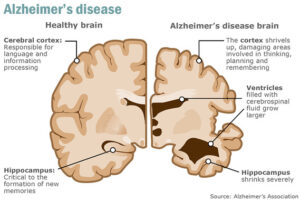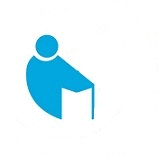Alzheimer’s disease
 Alzheimer’s disease is a progressive neurologic disorder that causes the brain to shrink (atrophy) and brain cells to die. Alzheimer’s disease is the most common cause of dementia — a continuous decline in thinking, behavioral and social skills that affects a person’s ability to function independently.
Alzheimer’s disease is a progressive neurologic disorder that causes the brain to shrink (atrophy) and brain cells to die. Alzheimer’s disease is the most common cause of dementia — a continuous decline in thinking, behavioral and social skills that affects a person’s ability to function independently.
Approximately 5.8 million people in the United States age 65 and older live with Alzheimer’s disease. Of those, 80% are 75 years old and older. Out of the approximately 50 million people worldwide with dementia, between 60% and 70% are estimated to have Alzheimer’s disease.
The early signs of the disease include forgetting recent events or conversations. As the disease progresses, a person with Alzheimer’s disease will develop severe memory impairment and lose the ability to carry out everyday tasks.
Medications may temporarily improve or slow progression of symptoms. These treatments can sometimes help people with Alzheimer’s disease maximize function and maintain independence for a time. Different programs and services can help support people with Alzheimer’s disease and their caregivers.
There is no treatment that cures Alzheimer’s disease or alters the disease process in the brain. In advanced stages of the disease, complications from severe loss of brain function — such as dehydration, malnutrition or infection — result in death.
Symptoms
Memory loss is the key symptom of Alzheimer’s disease. Early signs include difficulty remembering recent events or conversations. As the disease progresses, memory impairments worsen and other symptoms develop.
At first, a person with Alzheimer’s disease may be aware of having difficulty remembering things and organizing thoughts. A family member or friend may be more likely to notice how the symptoms worsen.
Brain changes associated with Alzheimer’s disease lead to growing trouble with:
Treatment
- Drugs
Current Alzheimer’s medications can help for a time with memory symptoms and other cognitive changes. Two types of drugs are currently used to treat cognitive symptoms:
• Cholinesterase inhibitors. These drugs work by boosting levels of cell-to-cell communication by preserving a chemical messenger that is depleted in the brain by Alzheimer’s disease. These are usually the first medications tried, and most people see modest improvements in symptoms.
Cholinesterase inhibitors may also improve neuropsychiatric symptoms, such as agitation or depression. Commonly prescribed cholinesterase inhibitors include donepezil (Aricept), galantamine (Razadyne) and rivastigmine (Exelon).
The main side effects of these drugs include diarrhea, nausea, loss of appetite and sleep disturbances. In people with certain heart disorders, serious side effects may include cardiac arrhythmia.
• Memantine (Namenda). This drug works in another brain cell communication network and slows the progression of symptoms with moderate to severe Alzheimer’s disease. It’s sometimes used in combination with a cholinesterase inhibitor. Relatively rare side effects include dizziness and confusion.
- Repetitive Transcranial Magnetic Stimulation (rTMS)
In preclinical studies in murine model of vascular dementia, rTMS was able to improve cognitive deficits by modified hippocampal synaptic plasticity and increased BDNF. Also low frequency rTMS may promote hippocampal synaptic plasticity through increased expression of the Bcl-2
and reduced expression of Bax in VaD model rats.
Moreover repetitive TMS might become useful in the rehabilitation of patients with dementia in the attempt to restore impaired brain plasticity.
Cortical excitability is increased in Alzheimer’s disease and in vascular dementia, and short-latency afferent inhibition is normal in vascular dementia, but suppressed in Alzheimer’s disease. Bentwich et al. combined rTMS with cognitive training in Alzheimer’s disease patients who were treated for more than two months with cholinesterase inhibitors.
These patients were subjected to daily rTMScognitive training sessions (5/week) for 6 weeks, followed by maintenance session (2/week) for an additional 3 months. They demonstrated a significant improvement in Alzheimer Disease Assessment Scale-Cognitive after 6 weeks of treatment.

